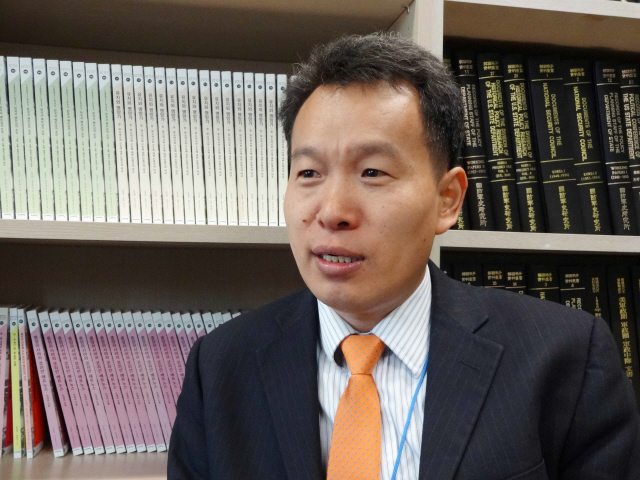 |
|
Zheng Jiyong, director of the Center for Korean Studies at Fudan University (Hankyoreh archive)
|
Zheng Jiyong predicts China will play role of giving confidence to North Korea, regardless of circumstances
China warmly welcomed the Panmunjom Declaration released by the leaders of South and North Korea on Apr. 27. During an interview with the Hankyoreh on Apr. 29, Zheng Jiyong, director of the Center for Korean Studies at Fudan University, gave the agreement high praise as “an event that will bring revolutionary change to dynamic relations in Northeast Asia.” He brushed aside “unnecessary concerns” about China being sidelined and predicted that China will play the role of giving confidence to North Korea. Hankyoreh (Hani): How would you assess the inter-Korean summit? Zheng Jiyong (Zheng): I think the summit will represent the fourth most revolutionary transformation of affairs on the Korean Peninsula, following the First Sino-Japanese War, the Korean War and the establishment of diplomatic relations between South Korea and China. What sets the summit apart from these previous incidents is that it was brought to fruition through the efforts of South and North Korea alone. The previous incidents were coercive changes resulting from wars and hegemonic struggles by outside forces, but this time, power internal to the Korean Peninsula has overcome power external to it. Hani: Some Chinese experts are concerned that South and North Korea are trying to exclude China. Zheng: That seems like the wrong observation. Whether we are speaking historically or practically, the war cannot be ended nor can peace be declared on the Korean Peninsula without China. When North Korean leader Kim Jong-un visited Beijing last month, he probably gained a deeper understanding of Korean Peninsula affairs as well as confidence that the inter-Korean and North Korea-US summits could be successful. Experts [in China who hold such views] need to acknowledge the wrongness of the unbalanced policy between South and North Korea – that is, the policy of staying close to one party and excluding the other on the Korean Peninsula – and to sincerely seek peace and stability on the Korean Peninsula. Hani: How do you regard North Korea’s commitment to give up nuclear weapons? Zheng: North Korea and the US are talking about different concepts of denuclearization. The North wants denuclearization of the Korean Peninsula, and beyond that of the entire world, under the condition that the security of the regime will be maintained. [To be sure,] that’s too idealistic. It’s also different from the American idea of North Korea denuclearizing by itself. Just as the US talks about “complete, verifiable and irreversible denuclearization,” North Korea also wants a promise for the “complete, verifiable and irreversible” security of its regime. Since Kim brought up “giving up nuclear weapons” and “denuclearization,” both North Korea and the US have been using these terms. The conceptual gap between North Korea and the US needs to be narrowed. That is the role that South Korea should play moving forward. Hani: What about China’s role? Zheng: China needs to instill more confidence in North Korea in terms of security and enable Kim to boldly take another step. Its role is to give the North more courage and integrate it into the international community. That means being a supportive “backer” of the North regardless of the circumstances. Hani: Do you think that North Korea will adopt Chinese-style reforms and openings? Zheng: North Korea acknowledges that it is closed off and uses the term “adjustment” instead of “reform and opening,” which deny the order they’ve maintained to the present day. They could pursue “adjustment with North Korean characteristics” in line with their political and social reality while referring to several models – not only the Chinese model, but also to the Soviet and Vietnamese ones. Since a rapid influx of ideas from abroad could deliver a shock to North Korea’s vulnerable economy and society, the North Korean government and society will have to take the right steps. The question of what exactly those steps should be will be a major question in the future. In that regard, the Chinese Communist Party’s method of leading society, and in particular the increasing strength of its leadership in recent years, could give the North a reason to feel confident. By Kim Oi-hyun, Beijing correspondent Please direct questions or comments to [english@hani.co.kr]






